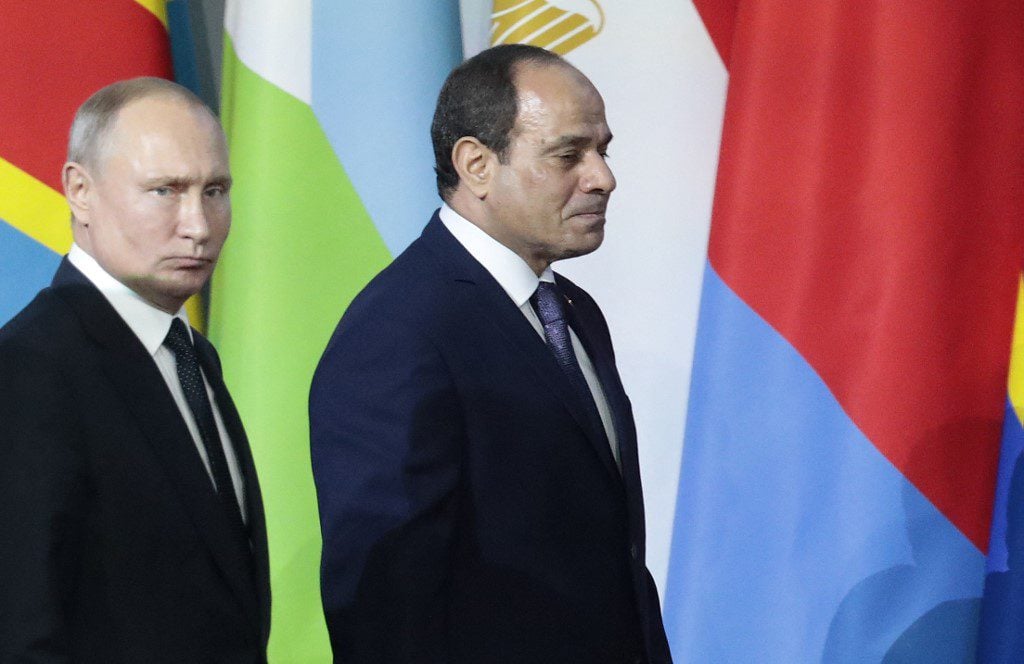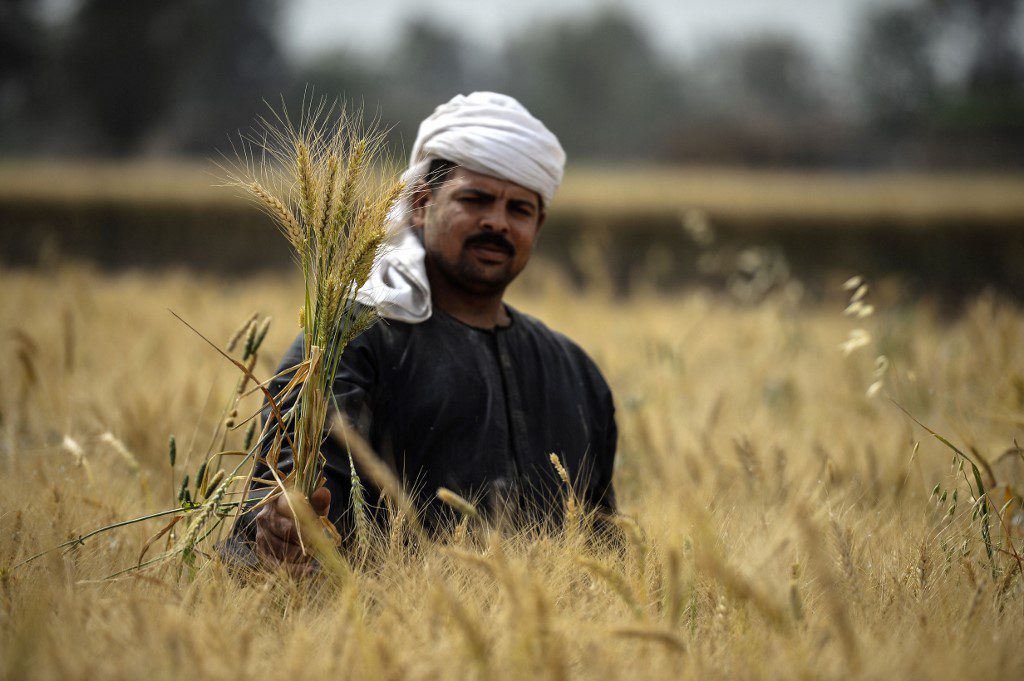
Khaled Mahmoud
As the current Russian-Ukrainian crisis escalates, Egyptian decision-makers encounter a rigorous dilemma like other allies of Russia and the United States in the Arab region and the Middle East.
At the same time, merchants in Egypt sought to exploit the crisis to raise prices excessively. An old common joke that the Egyptians circulated had attributed any price raise in the market to the rise of the US dollar. Now, in obscure sarcasm, merchants declare that the reason behind their high prices is the Ukrainian crisis.
As the Russian war enters its fifth week, US and western pressures have piled on Cairo, pushing it towards a stance that resembles their strict stance against Egypt’s significant strategic ally, Russia.
Western Pressure
For instance, several ambassadors of Western countries in Cairo have issued a statement in an attempt to pressure Cairo to support Ukraine.
The statement issued by the ambassadors of Canada, France, Germany, Italy, Japan, the United Kingdom, the United States and the European Union in Cairo considered that Russia’s attempt to destabilise the international system would also resonate in the Middle East and Africa, including Egypt.
The statement pointed out that Egypt is already suffering due to the Russian aggression, given that it is the largest importer of wheat in the world. And since Ukraine is one of the largest exporters of wheat, this vital trade is now threatened by Russia’s futile war against Ukraine.
The statement concluded that “The Russian aggression means a rise in wheat and food commodities prices in Egypt and Africa.” It also implied that millions of Ukrainian tourists wouldn’t be able to visit Egypt, directly impacting Egyptian tourism.
The statement has implicitly called on the Egyptian government to adhere to peace, security, stability and sovereignty based on international rules. It recalled that Egypt, since late President Gamal Abdel-Nasser’s reign, had supported the principle of non-interference in internal affairs as a basis for the modern international system. In addition, It firmly believes in the UN’s significance and considers it a powerful supporter of its Charter.
The close political and military relations with Russia did not prevent Egypt from joining the international community in condemning the Russian military operation against Ukraine.
Nevertheless, Cairo sought to avoid tension with Moscow and precluded this crisis file from the future and nature of Russian-Egyptian relations.
In the recent phone call with his Russian counterpart, President Vladimir Putin, Egyptian President Abdel-Fattah al-Sisi asserted the necessity of dialogue between the two countries, promising Egypt’s support for all diplomatic endeavours which might accelerate the political settlement of the crisis to curb any further deterioration and uphold international stability and security.
He also affirmed Egypt’s willingness to support this direction through its vigorous actions in this regard, whether bilaterally or at the multilateral level.
The Egyptian presidential statement was keen to signify the two parties’ affirmation of what it described as “the strong historical cooperation relations that bound Egypt and Russia in various fields, in addition to the friendly relations between the two countries at both the official and popular levels.”
On the other hand, through its Foreign Ministry, Russia completely abstained from mentioning the Ukrainian file in the phone conversation between Putin and Sisi. It only referred to the two presidents dwelling on issues of developing the strategic partnership between Russia and Egypt, including implementing major joint nuclear energy projects.
The Russian Foreign Ministry pointed out that the Egyptian president thanked the Russian side for the ongoing efforts to evacuate Egyptian citizens from the conflict zone.
But the Kremlin was clear when it said in its statement, “As per Sisi’s request, Putin explained the reasons and objectives of the Russian special military operation to protect Donbas, and also informed him of the Russian efforts throughout the negotiations with the Ukrainian representatives.”
The American Arms Dilemma
According to analysts, the Russian-Ukrainian crisis has urged many of the United States’ longtime security partners in the Middle East to diversify their relations. Egypt was the most prominent example of this phenomenon, as Cairo is preparing to receive the Russian-made Sukhoi Su-35, a transaction that may lead to sanctions by the US Congress.
However, this didn’t affect Egypt’s access to American weapons. The US Senate approved a deal to sell C-130J Super Hercules to Egypt, worth $2.2 billion, by 81 votes against 18 senates that tried to block the deal due to human rights concerns.
Despite the efforts of some senators to stop the deal, believing that “American companies should not sell weapons to human rights-abusing governments,” the Pentagon has announced the consummation of the deal, which includes support equipment, spare parts and technical backup. Lockheed Martin is the main contractor in this deal.
In addition to the American track, Egypt’s stances on the Ukrainian crisis collide with the EU’s, which turned a blind eye to the Grand Ethiopian Renaissance Dam on the Nile River, one of the most hazardous and sensitive issues for the Egyptians.
The European message that the EU’s Special Representative for the Horn of Africa and the Red Sea, Annette Weber, was keen to layout in a meeting in Cairo with Egyptian journalists was clear. In her first visit since assuming her post during an African tour, Weber highlighted “the EU’s growing interest, in the light of the Russian war against Ukraine, in energy needs and in diversifying its sources.” She also emphasised the interest in “the security of the Red Sea region, through which 20 per cent of the European Union’s trade passes.”
Despite some warnings, Egypt may lose Western support on many economic and political issues if it does not stop adopting what they described as “vague and disappointing stances” toward Russian aggression against Ukraine.
Egyptian Priorities

However, according to senior Egyptian officials’ statements, nothing concerns the Egyptians more than wheat and tourism.
Egyptian Prime Minister Mostafa Madbouly forbade any goods hoarding or monopoly to alleviate the public opinion’s persistent fears of rising prices.
According to Madbouly, it is normal for Egypt to be affected by all these rises and consecutive inflationary waves that have been hitting the world since the Russian-Ukrainian crisis.
Madbouly pointed out that his government anticipated the crisis and worked to absorb the largest possible amount of the damaging effects of inflation, burdening the citizens with only a small portion.
He also announced that he would work to provide a permanent excess reserve of basic commodities for not less than three to six months. Accordingly, he has confirmed that Egypt doesn’t need to purchase additional shipments.
In the same context, he added that the local wheat harvesting season would commence in mid-April, which prompted him to reassure the Egyptians that there is no crisis nor need to import wheat required to produce subsidised bread until the end of 2022.
By expanding outlets for selling goods to citizens at relatively low prices, the Egyptian government seeks to mitigate the losses during the Holy month of Ramadan. In a meeting he held with the Board of Governors, Madbouly pledged to prevent any unacceptable practices related to monopolising or stockpiling any commodities or imposing an unjustified increase in the prices of some commodities in light of this crisis.
Egyptian Finance Minister Mohamed Maait affirmed that the Ukrainian crisis will have repercussions on the country, noting that “the wheat clause in the state budget will increase by 15 billion EGP (about $820 million).” According to Maait, Egypt used to buy a ton of wheat before the Ukrainian crisis for $250 per ton, before it reached more than $400 currently.
However, this did not prevent the annual inflation rate in Egypt from rising to 10 per cent in February, recording the highest rate since mid-2019. The Central Agency for Public Mobilization and Statistics statement attributed the increased inflation rate to the rise in food and beverage prices by 20.1 per cent, primarily vegetables, fruits, bread, and grain.
Egypt witnessed an unprecedented wave of inflation after the Central Bank decided to float the Egyptian pound as part of an economic reform program the Egyptian government launched in November 2016. The inflation reached its peak in July 2017, as the annual consumer price index recorded 34.2 per cent. However, it proceeded to decline, reaching the current rate.
The economic reform program also removed fuel subsidies and imposed a value-added tax, on account of which Egypt has obtained a $12 billion loan from the IMF in 2016.
Tourism Decline

Reservations by Russian and Ukrainian tourists in Egypt have recently declined by 30 per cent, which negatively affected hotel occupancy, especially in Sharm al-Sheikh and Hurghada resorts. Also, hundreds of Ukrainian and Russian bookings to Egypt were cancelled.
The average of Ukrainian tourist trips to South Sinai had counted up to about 264 flights in January 2022 and about 188 flights in February of the same year. The average of Russian tourist trips have amounted to 463 in January 2022 and didn’t exceed 225 trips in February.
The Ukrainian ambassador in Cairo stated that about 20,000 Ukrainian tourists had been stranded in Egypt because of the conflict. Most of whom are in resorts overlooking the Red Sea.
While the Egyptian tourism sector is trying to recover from a series of setbacks in the past few years, the Ukraine crisis adds an additional dimension to its troubles since about a third of its inbound tourism is from Russia and Ukraine.
There are expectations that the war will have devastating effects on this sector. Hence, the government should pursue alternative markets, including England and Germany, as the tourism companies rely on them to compensate for this shortfall.
In this context, Deputy Egyptian Tourism Minister Ghada Shalaby is considering new methods to attract tourists. Shalaby told Reuters that Egypt is working to boost the number of tourists from Western Europe, including Britain, Germany, Spain, France, Italy, Hungary and the Gulf states, especially before Ramadan and Easter next month.
The crisis may positively impact the Suez Canal, as ships that usually sail the Russian Northern Sea Route will have to divert to pass through the Suez Canal, for it will be the fastest and safest passage, which means more revenue.


